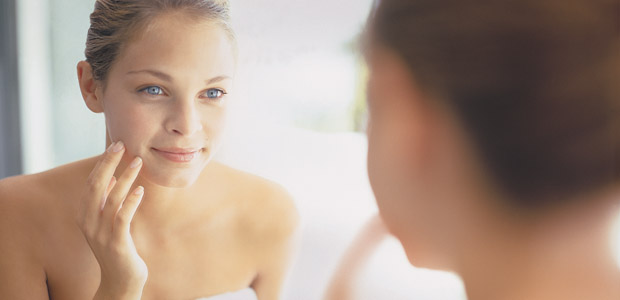Advertisement
Stories Skin Can Tell
Some of us might blame our bathroom lighting for the dark circles under our eyes and our pale faces. But eczema, psoriasis, blemishes, blackheads, acne and scarring can’t be so easily dismissed. Your skin is trying to tell you something. Your skin is the largest organ of your body. It is also one of the … Continued

Some of us might blame our bathroom lighting for the dark circles under our eyes and our pale faces. But eczema, psoriasis, blemishes, blackheads, acne and scarring can’t be so easily dismissed. Your skin is trying to tell you something.
Your skin is the largest organ of your body. It is also one of the main means of eliminating wastes from your body, along with your liver, bowels, kidneys and lungs. When any of these is congested and incompletely eliminating wastes, the remaining systems (such as your skin) must pick up the slack.
Whenever you see trouble with your skin’s complexion, you need to know that the most frequent cause is not just “cookie karma” (blemishes resulting from eating junk food). It is most likely to be your liver and bowels.
What makes your liver so important? To begin with, your liver filters one and a half litres of your blood every minute! Blood is kept clean and healthy by your liver. Add to that the digestive products that are shunted through your liver–digested proteins and fats–all of which your liver metabolizes for your body’s use. The liver also produces the blood clotting elements necessary for wound repair. On top of that, the liver detoxifies poisons such as drugs and alcohol. (Your liver will also work overtime trying desperately to detoxify any food additives, preservatives and pesticides you ingest.)
Your body’s over-abundance of steroids and hormones is deactivated by your liver. Old blood cells are broken down so that new ones can be made from their recycled constituents. (Take a breath, there’s more.) Your hard-working liver manufactures vitamin A from the beta-carotene in your diet, and stores vitamins B12, A, D, K as well as iron. In an average adult, the liver also produces one litre of bile daily to aid digestion and excretion of digestive wastes. (Your gall bladder stores most of it.)
Bitter Beauty
There are a lot of herbs that are specific to the liver, and while taking a single herb is helpful, taking a blend of herbs will often yield greater benefits. Some of them don’t even taste particularly horrible. (I should warn you, most do.)
Bitters (wild garlic, nettles, dandelion, burdock, sorrel, agrimony, yellow dock, rhubarb and wormwood) are an acquired taste, as many of our adult tastes are. It’s vitally important to learn to acquire a taste for these, because taking bitter herbs in capsules will defeat the benefits of bitters. Your nervous system is stimulated by the bitter receptors in your tongue and not by your stomach!
Many Europeans finish their meal with a small bitters drink. Closer to home, the Cree nations know that a daily chewing of ratroot improves digestion, the immune system, endurance, energy, longevity and mental clarity.
The dandelion (which really should be our national flower), is a herb as close as your lawn, and is second to none in normalizing, cleansing and strengthening liver function. Even when taken as a delicious roasted tea, dandelion still has wonderful benefits to confer upon your digestion and your skin. Drink three cups a day to help your liver and pancreas function better.
If you are presently on an antibiotic like tetracycline, for acne, then you should know that this type of medication lowers the absorption of vitamins C and K, as well as the minerals iron, zinc, magnesium and calcium. High calcium intake also interferes with tetracycline absorption. By contrast (with rare exceptions), herbs add to vitamin and mineral stores in the body.
Blackheads often indicate digestive, intestinal and liver congestion. Add some liver herbs to your daily intake of fruits and vegetables.
Acne, psoriasis and eczema can point to an inadequate amount of essential fatty acids (good fats) being consumed. Forget margarine, hydrogenated oils and the vast majority of vegetable oils available in grocery stores-all these contain fats that are harmful. They also require a large supply of good fats to neutralize them. Avoid them, and take instead cold pressed oils, such as olive, flax, walnut, hemp, sunflower or almond. Even pure butter is a far better choice for your liver–and your skin-than margarine could ever be.
Try adding bitter herbs to your lunch and dinner menus. Greens like radicchio, endive, mustard, dandelion, sorrel and spinach are good basics for salads. Add some dried bitter herbs to the dressing. Sample steamed burdock as a cooked root vegetable. (Great with a dab of butter.) Drink yarrow, burdock or dandelion teas between meals.
Liver herbs don’t work in a vacuum. Drink half an ounce (about 14 mL) of pure water for each pound (half a kilogram) of your body weight. Sleep long enough to awaken rested. Make exercise part of your daily routine. Eat well and be involved with your family and community. Cultivate an entire life.




